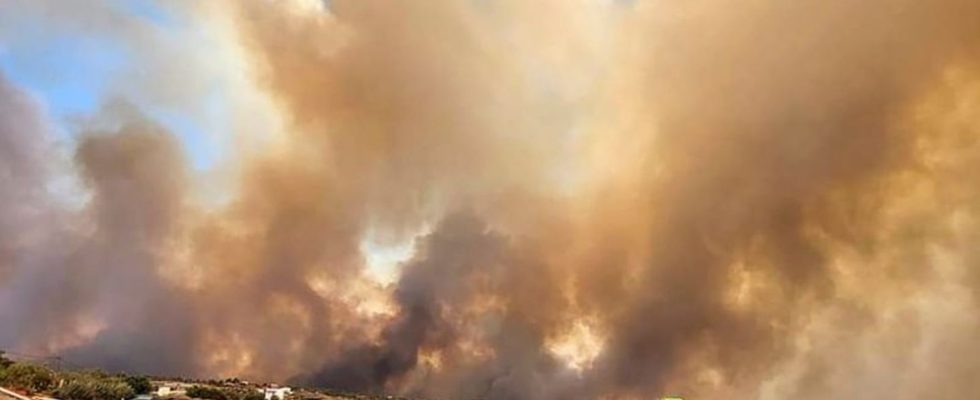climate
Fierce fires on Rhodes: vacationers are evacuated
Dense clouds of smoke rise into the sky over Rhodes. The major forest fire on the Greek island is already in its fifth day. photo
© uncredited/Rhodes.Rodos/AP/dpa
The heat wave in Greece is continuing – and according to weather experts it is even getting worse. A big fire is raging on Rhodes, hotels are being evacuated. There hasn’t been any rain there for a long time.
In Greece, the situation on the holiday island is coming to a head Rhodes after a forest fire broke out. Two villages and several hotels had to be evacuated there on Saturday. State radio reported in a special that evening that 8,000 people had left the south of the island, which is popular with tourists, by land. The number could be even higher, it said.
There is no official information yet. A spokesman for the fire brigade had previously announced that 2,000 people had been brought to safety by boat from the coasts south of Lindos.
The forest fires that have been raging on Rhodes for three days got out of control in the afternoon. Force six winds blow in the Rhodes region. “The smoke is so strong that you can hardly breathe,” Konstantinos Traraslias, deputy mayor of Rhodes, told Athens news channel Skai. The people would be taken to the small town of Gennadi, from where they would be accommodated in hotels.
Wind fuels fires
As the government in Athens announced in the evening, eight people with respiratory problems were taken to the hospital. Due to the change in wind direction, the fire turned towards the coast and surprised the fire brigade, a spokesman said.
In the course of global warming, the risk of forest fires is increasing in many regions, as the Intergovernmental Panel on Climate Change (IPCC) has established. A warmer climate can contribute to more water falling from the sky, also more often in the form of heavy rain. However, the periods without precipitation are becoming longer in some cases. And especially in areas that are already dry, the danger of periods of drought increases. Forest fires can spread faster in extremely dry vegetation.
“It is the most difficult fire we have to deal with,” said a spokesman for the Greek fire brigade. In the afternoon, the Coast Guard spoke of 1,500 people who had been brought to safety from the beaches because escape routes were cut off. Most of them were tourists. Fishermen and private individuals also took people with their boats. The tourists should be accommodated in hotels and in a basketball hall.
Locals help tourists
Hundreds of Rhodes residents volunteered to help the tourists, state television reported. The German Travel Association informed the German Press Agency: “A total of around 20,000 German vacationers from tour operators are currently staying on the island, and only a small number are affected by the evacuations.”
It hasn’t rained on Rhodes for a long time, it is very dry – and there is no end in sight to the heat wave. As the Meteorological Office announced, values of up to 45 degrees Celsius are expected for Sunday in the south of the country. In the central Greek city of Larisa, the thermometer showed 44 degrees in the early afternoon.
Meteorologist fears record heat
In northern Greece, too, there were values around 40 degrees in many places. Even most of the Aegean islands have temperatures above 38 degrees. One of the leading Greek meteorologists, Konstantinos Lagouvardos, estimated on state television that this heat wave could be the longest since measurements have been taken in Greece “if things continue like this”. In July 1987, a similar heat wave in Greece killed an estimated 1,300 people.
The fire brigade again warned of the great danger of forest fires. “We have even more difficult times ahead of us,” said a spokesman for state television. The fires in the Athens area and on the Peloponnese peninsula have been brought under control. But they flare up again and again because everything has dried up, they said.
Extreme weather also in Italy
The Italian meteorologists are also expecting a new heat wave at the beginning of next week. Then between Sardinia and Sicily peak temperatures of 47 to 48 degrees are possible, wrote the weather service Ilmeteo.it. The weather service of the Italian Air Force registered 40 degrees from Palermo, the capital of Sicily, in the early afternoon. In Rome it was 37 degrees. 41.8 degrees had already been measured there last Tuesday.
Meanwhile, severe storms in northern and central Italy caused considerable damage. The area around Bologna and the Adriatic coast were among those affected. The weather service for the Emilia-Romagna region, whose capital is Bologna, also reported severe thunderstorms from the provinces of Reggio Emilia, Ferrara and Ravenna. Photos showed downed power poles, collapsed houses, scattered roof tiles and wrecked cars. One video showed bathers fleeing the beach en masse in Lido di Classe near Ravenna. The exact extent of the damage was not yet clear.

